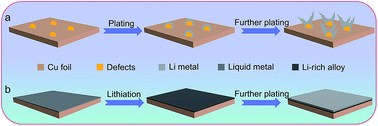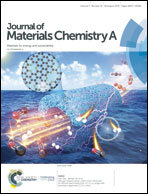Uniform Li deposition by regulating the initial nucleation barrier via a simple liquid-metal coating for a dendrite-free Li–metal anode†
Abstract
Lithium metal has long been recognized as the ultimate anode due to its low density, ultrahigh theoretical specific capacity, and lowest electrochemical potential. However, a number of issues, such as the uncontrollable growth of Li dendrites and unstable SEI during repeated Li plating/stripping processes, impede its practical application. Herein, uniform Li deposition on metallic current collectors was achieved via regulating the initial nucleation barrier by coating a thin 3 °C GaInSnZn liquid-metal layer on the surface. In the plating process of Li on liquid-metal-coated current collectors, a lithiation process initially occurred by the formation of a Li-rich alloy layer. As this Li-rich alloy layer was lithiophilic, the nucleation barrier was reduced, and Li was readily nucleated and uniformly grown on the alloy sites in the further plating process. As a result, liquid-metal-modified Cu foil exhibited improved coulombic efficiency and a smaller voltage fluctuation in the plating/stripping process. Better electrochemical performance was also demonstrated in full cells with LiFePO4 as the cathode. This work proposes a new and facile strategy for inducing the uniform deposition of Li, paving the way for the practical application of Li–metal anodes in high-energy-density Li–metal batteries.



 Please wait while we load your content...
Please wait while we load your content...